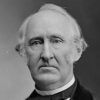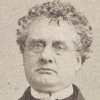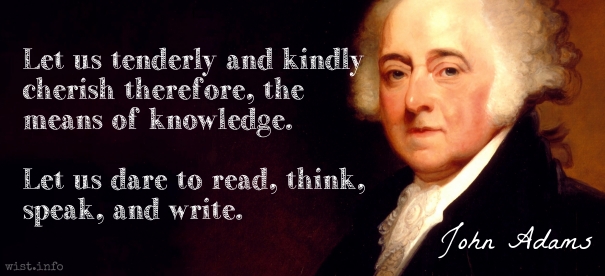We’re stronger because we’re democracies. We’re not afraid of free and fair elections, because true legitimacy can only come from one source — and that is the people. We’re not afraid of an independent judiciary, because no one is above the law. We’re not afraid of a free press or vibrant debate or a strong civil society, because leaders must be held accountable. We’re not afraid to let our young people go online to learn and discover and organize , because we know that countries are more successful when citizens are free to think for themselves.
Barack Obama (b. 1961) American politician, US President (2009-2017)
Speech, Nordea Concert Hall, Tallinn, Estonia (3 Sep 2014)
(Source)
Quotations about:
civil liberties
Note not all quotations have been tagged, so Search may find additional quotes on this topic.
Who are those who are really disloyal? Those who inflame racial hatreds, who sow religious and class dissensions. Those who subvert the Constitution by violating the freedom of the ballot box. Those who make a mockery of majority rule by the use of the filibuster. Those who impair democracy by denying equal educational facilities. Those who frustrate justice by lynch law or by making a farce of jury trials. Those who deny freedom of speech and of the press and of assembly. Those who press for special favors against the interest of the commonwealth. Those who regard public office as a source of private gain. Those who would exalt the military over the civil. Those who for selfish and private purposes stir up national antagonisms and expose the world to the ruin of war.
The Bill of Rights was not written into the Constitution in order to protect governments from “trouble,” but so that the people might have a legitimate method of causing trouble to governments they no longer trusted.
Henry Steele Commager (1902-1998) American historian, writer, activist
Letter to the Editor, New York Times (17 Jun 1971)
(Source)
The time to assert rights is when they are denied; the men to assert them are those to whom they are denied. The community which dares not protect its humblest and most hated member in the free utterance of his opinions, no matter how false or hateful, is only a gang of slaves.
Wendell Phillips (1811-1884) American abolitionist, orator, social activist
“Mobs and Education,” Speech, Twenty-Eighth Congregational Society, Boston (16 Dec 1860)
(Source)
As reported in the Liberator (21 Dec 1860).
Note: There is a synthetic quotation frequently attributed to Phillips that is a actually combination of this one, and these three others:
No matter whose lips that would speak, they must be free and ungagged. The community which dares not protect its humblest and most hated member in the free utterance of his opinions, no matter how false or hateful, is only a gang of slaves. If there is anything in the universe that can’t stand discussion, let it crack.
While Phillips often reused rhetorical elements (as most orators do), this particular combination appears to be combination not actually found in his speeches or writing.
“The right to think, to know and to utter,” as John Milton said, is the dearest of all liberties. Without this right, there can be no liberty to any people; with it, there can be no slavery.
John A. Andrew (1818-1867) American lawyer, politician, abolitionist
Letter (1860)
(Source)
Letter written after his election as Massachusetts governor. referencing Milton's Areopagitica. Quoted by Wendell Phillips in his "Mobs and Education" speech (16 Dec 1860), and often attributed to Phillips.
Men are educated and the State uplifted by allowing all — every one — to broach all their mistakes and advocate all their errors. The community that will not protect its most ignorant and unpopular member in the free utterance of his opinions, no matter how false or hateful, is only a gang of slaves.
Wendell Phillips (1811-1884) American abolitionist, orator, social activist
“The Scholar in a Republic,” Speech, Centennial Anniversary of the Phi Beta Kapa of Harvard College (30 Jun 1881)
(Source)
Let us shun extremes, not only because each extreme is in itself a positive evil, but also because each extreme necessarily engenders its opposite. If we love civil and religious freedom, let us in the day of danger uphold law and order. If we are zealous for law and order, let us prize, as the best safeguard of law and order, civil and religious freedom.
Thomas Babington Macaulay (1800-1859) English writer and politician
Speech on re-election to Parliament, Edinburgh (2 Nov 1852)
(Source)
Let us tenderly and kindly cherish, therefore, the means of knowledge. Let us dare to read, think, speak and write.
John Adams (1735-1826) American lawyer, Founding Father, statesman, US President (1797-1801)
“A Dissertation on the Canon and the Feudal Law” No. 4, Boston Gazette (1765-10-21)
(Source)
If the government can round up someone and never be required to explain why, then it’s no longer the United States of America as you and I always understood it. Our enemies have succeeded beyond their wildest dreams. They have made us become like them.
Garrison Keillor (b. 1942) American entertainer, author
“Congress’s Shameful Retreat From American Values,” Chicago Tribune (4 Oct 2006)
(Source)
It is bad to be oppressed by a minority, but it is worse to be oppressed by a majority. For there is a reserve of latent power in the masses which, if it is called into play, the minority can seldom resist.
John Dalberg, Lord Acton (1834-1902) British historian
“The History of Freedom in Antiquity,” Speech, Bridgenorth Institute (28 Feb 1877)
(Source)
To preserve the freedom of the human mind, then, and freedom of the press, every spirit should be ready to devote itself to martyrdom; for as long as we may think as we will, and speak as we think, the condition of man will proceed in improvement.
Thomas Jefferson (1743-1826) American political philosopher, polymath, statesman, US President (1801-09)
Letter to William Green Mumford (18 Jun 1799)
(Source)
Certainly the First Amendment’s language leaves no room for inference that abridgments of speech and press can be made just because they are slight. That Amendment provides, in simple words, that “Congress shall make no law … abridging the freedom of speech, or of the press.” I read “no law … abridging” to mean no law abridging.
Hugo Black (1886-1971) American politician and jurist, US Supreme Court Justice (1937-71)
Smith v. California, 361 U.S. 147, 157 (1959) [concurring]
(Source)
The Bill of Rights is not a suicide pact.
Robert H. Jackson (1892-1954) US Supreme Court Justice (1941-54), lawyer, jurist, politician
Terminiello v. City of Chicago, 337 U.S. 37 (1949) [dissenting]
(Source)
Common paraphrase of Jackson's actual comment:
This Court has gone far toward accepting the doctrine that civil liberty means the removal of all restraints from these crowds, and that all local attempts to maintain order are impairments of the liberty of the citizen. The choice is not between order and liberty. It is between liberty with order and anarchy without either. There is danger that, if the Court does not temper its doctrinaire logic with a little practical wisdom, it will convert the constitutional Bill of Rights into a suicide pact.
Civil liberties had their origin and must find their ultimate guaranty in the faith of the people. If that faith should be lost, five or nine men in Washington could not long supply its want.
Robert H. Jackson (1892-1954) US Supreme Court Justice (1941-54), lawyer, jurist, politician
Douglas v. Jeannette 319 U.S. 157, 181 (1943) [concurring]
(Source)
The last lesson a man ever learns is, that liberty of thought and speech is the right for all mankind; that the man who denies every article of our creed is to be allowed to preach just as often and just as loud as we ourselves. We have learned this, — been taught it by persecution on the question of slavery. No matter whose lips that would speak, they must be free and ungagged. Let us always remember that he does not really believe his own opinions, who dares not give free scope to his opponent. Persecution is really want of faith in our creed.
Wendell Phillips (1811-1884) American abolitionist, orator, social activist
“The Boston Mob,” speech, Antislavery Meeting, Boston (21 Oct 1855)
(Source)
"On the Twentieth Anniversary of the Mob of October 21, 1835."
We must scrupulously guard the civil rights and civil liberties of all citizens, whatever their background. We must remember that any oppression, any injustice, any hatred, is a wedge designed to attack our civilization.
Franklin Delano Roosevelt (1882-1945) American lawyer, politician, statesman, US President (1933-1945)
Letter to William Allan Neilson (1940-01-09)
(Source)
Neilson was the co-chair of the Sponsor Committee, Fourth Annual Conference of the American Committee for Protection of Foreign-Born. It was read to the conference on 1 March 1940, and entered into the Congressional Record (along with other letters received) on 11 March.
About two years later, 19 February 1942, FDR signed Executive Order 9066, authorizing the evacuation of all persons (which largely meant Japanese-Americans) deemed a national security threat from the West Coast to internment centers further inland.
Freedom to discuss public affairs and public officials is unquestionably, as the Court today holds, the kind of speech the First Amendment was primarily designed to keep within the area of free discussion. To punish the exercise of this right to discuss public affairs or to penalize it through libel judgments is to abridge or shut off discussion of the very kind most needed. This Nation, I suspect, can live in peace without libel suits based on public discussions of public affairs and public officials. But I doubt that a country can live in freedom where its people can be made to suffer physically or financially for criticizing their government, its actions, or its officials.
Hugo Black (1886-1971) American politician and jurist, US Supreme Court Justice (1937-71)
New York Times Co. v. Sullivan, 376 U.S. 254, 296-297 (1964) [concurring]
(Source)
[T]he price of freedom of religion or of speech or of the press is that we must put up with, and even pay for, a good deal of rubbish.
Robert H. Jackson (1892-1954) US Supreme Court Justice (1941-54), lawyer, jurist, politician
United States v. Ballard, 322 U.S. 78 (1944) [dissent]
(Source)














